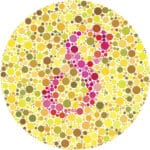If you have some degree of color blindness, you can usually thank your parents. Color blindness is usually hereditary — red/green and blue color blindness is usually passed down from your parents. The gene responsible for the condition is carried on the X chromosome; this is why color blindness affects men far more than women.… Read More »
Although most people think of the term crossed-eyed as meaning one thing, the clinical term strabismus can actually mean different varieties of this condition where the two eyes don’t effectively work together. While not typical, strabismus is not rare, either. The American Association for Pediatric Ophthalmology and Strabismus estimates that approximately 4 percent of the… Read More »
OK, we all have red eyes at times. Allergy season, windy days, maybe a few too many cocktails the night before — there are lots of reasons our eyes can become red. Since we like our patients to have happy eyes, here’s what could be behind your red eyes. Some of them merit a visit… Read More »
School and pink eye kind of go together. Kids go to PE and share a towel. They borrow a pencil that their friend used after touching their eye. They borrow a calculator. All of those harmless actions can results in inflammation of the conjunctiva. You know it as pink eye. Children get pink eye a… Read More »
When we’re young and have normal vision our eyes are in perfect condition. They can focus up close on objects as close as their nose and they can instantly switch that focus to a far away object. This is known as accommodation. Unfortunately, accommodation becomes, well, less accommodating as we get older. With every passing… Read More »
So, you just had your 40th birthday. Hopefully you survived the Depends (or worse) jokes and the black-frosted cake shaped like a tombstone. In reality, though, you’re probably less than halfway through your life. But there is one eye condition that begins around 40 and will make you feel older. It’s called presbyopia. While presbyopia… Read More »
Most of us have at least some flaw in our eyesight. If you’re over 40, your close vision is probably in need of reading glasses. That’s presbyopia and is almost universal for people over age 40. If you’re nearsighted, called myopia, that means you can see up close fine, but distance vision usually needs correction.… Read More »
While being out in our awesome natural landscape of California has tons of benefits for our mental and physical well being, there is a downside for your eyes — pterygium. Pterygium is an eye condition that affects people who spend a great deal of time outdoors. It involves the growth of pink, fleshy tissue on… Read More »
Each person’s eyes are unique, just like their fingerprints. Along with that line, each person’s eye health is unique. Eye health is affected by age, genetics, lifestyle, occupation, and underlying medical conditions. At Central Valley Eye Medical Group we’ve helped thousands of patients with various conditions that affect their eyes. We strive to stay on… Read More »










